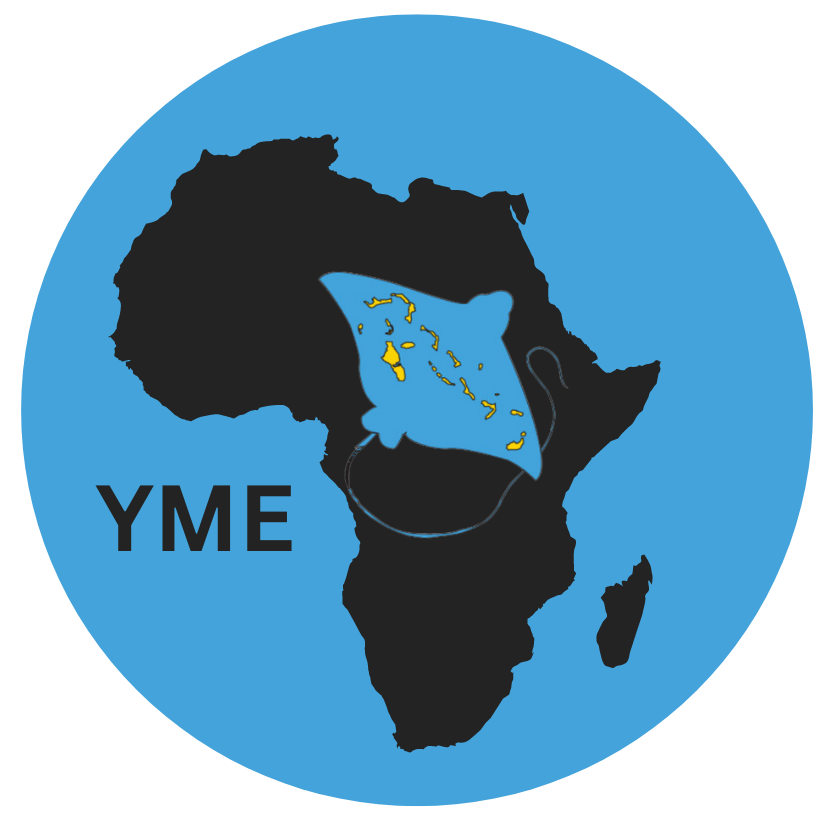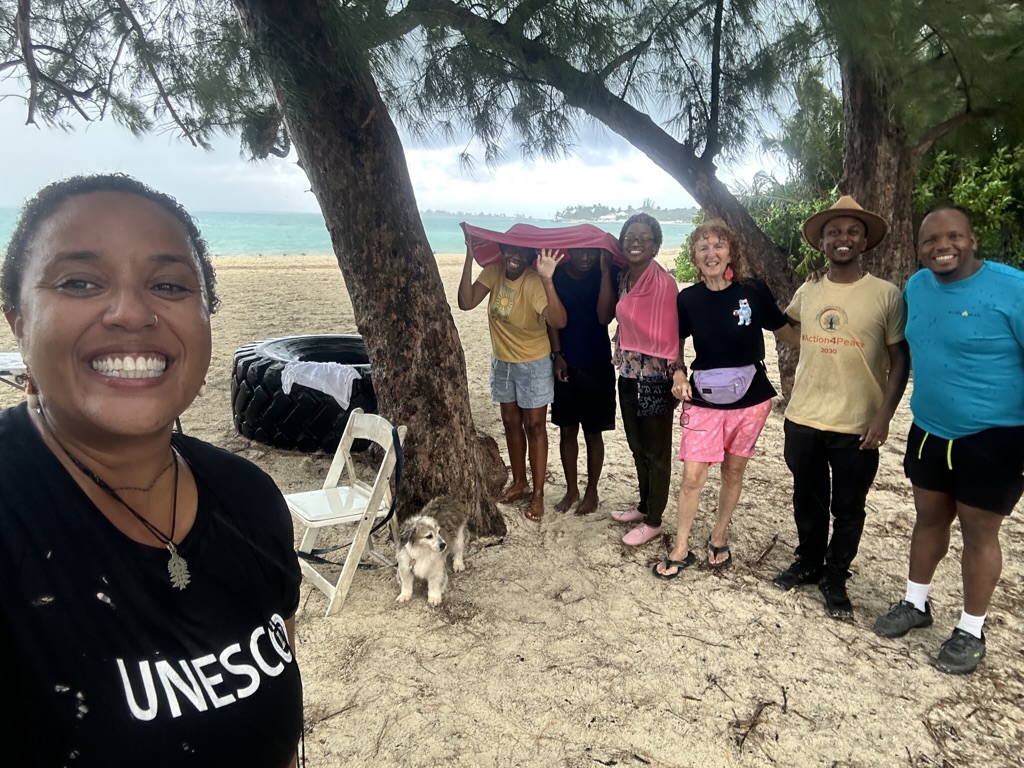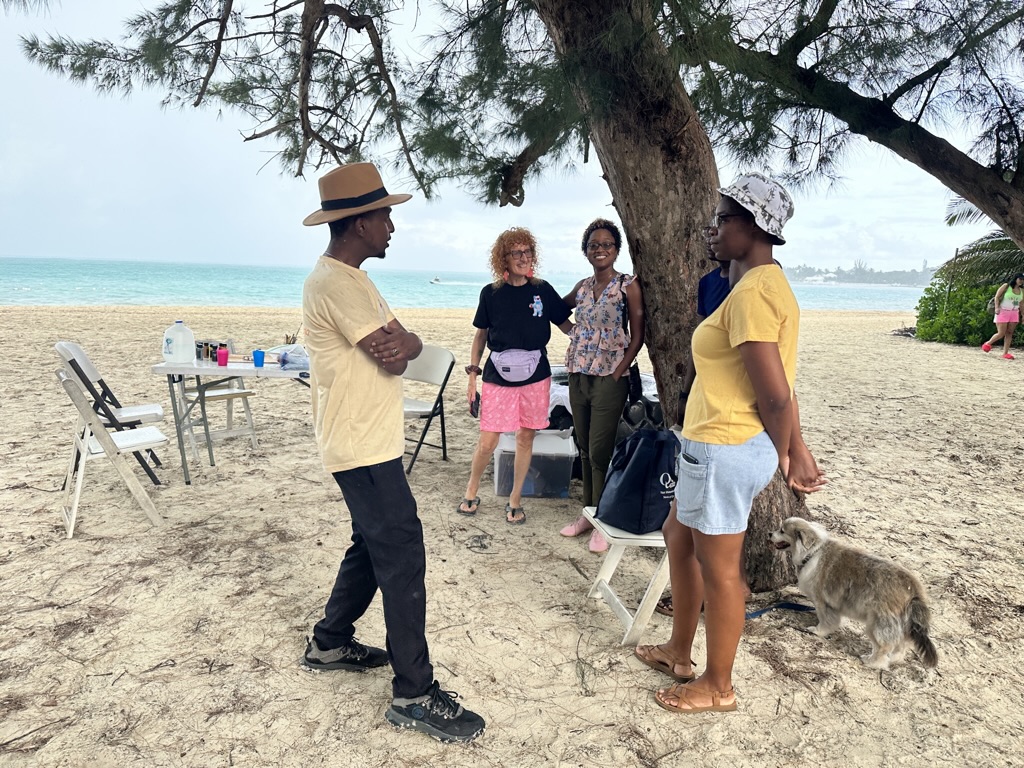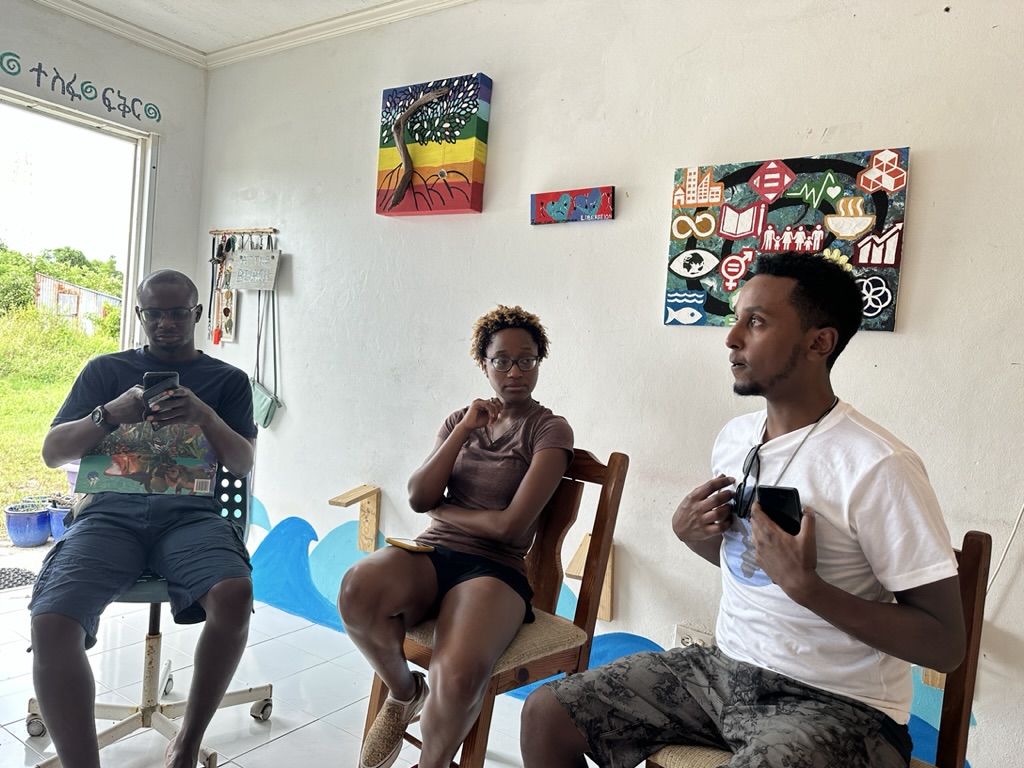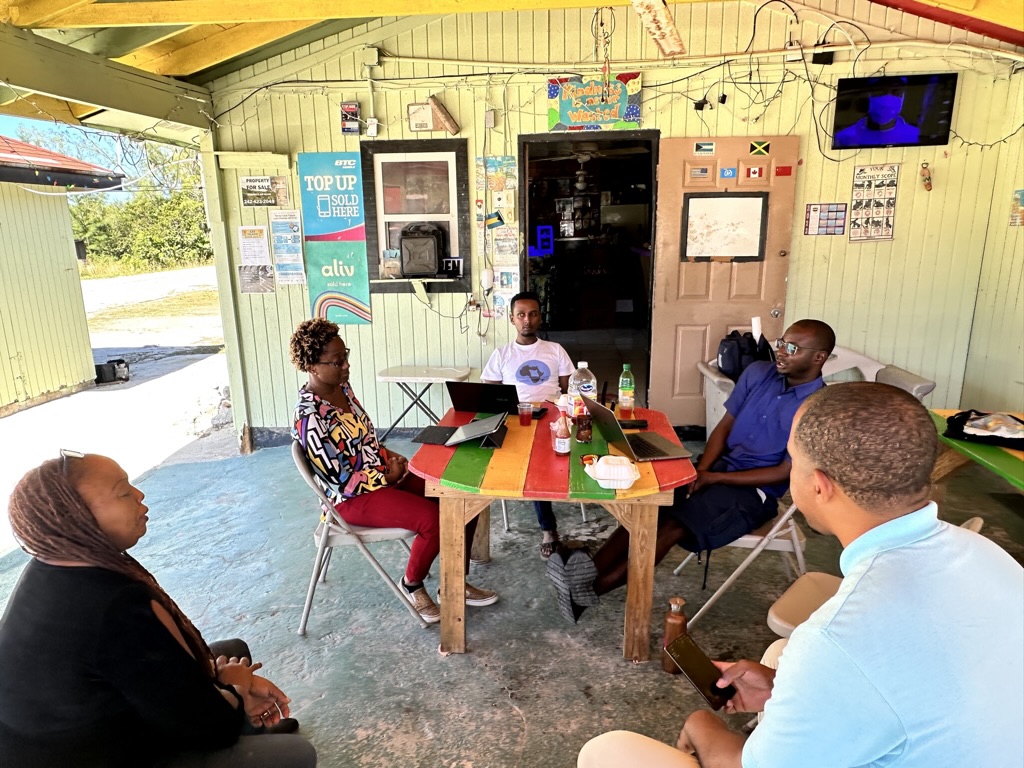The world is witnessing the co-evolution of two major phenomena – digitization and green transitions – both profoundly setting the pace and direction for 21st-century human progress. This reflects a double imperative. On the one hand, the clock is ticking for countries to reach their Sustainable Development Goals by 2030. On the other, countries are convinced that their future economic competitiveness will depend upon how quickly they transition to digital societies (UNESCO, 2021). The transition to digital and ‘green, blue, and orange’’ societies requires the development of a general awareness of AI and its connection to sustainable development and to the everyday life of Bahamians.
💡 Session 1: Introduction to AI-Green Lab and Fundamentals of AI October 10, 2023
The session provided a foundational understanding of AI, including the process of acquiring intelligence through data, information, knowledge, and wisdom. Participants discovered that AI is an integral part of everyday life, including recommendation systems and chatbots. The analogy between children learning and the way AI functions was a particularly interesting aspect of the discussion.
Highlights
- 🧠 The analogy between children learning and the way AI processes information was thought-provoking and provided a new perspective on artificial intelligence.
- 🤖 AI is a common and subtle part of everyday life, from recommendation algorithms to chatbots, impacting daily interactions in a significant way.
- 👩🎓 The session offered a foundational understanding of AI, covering the process of acquiring intelligence and the different levels of knowledge, from data to wisdom.
- 🧠What is intelligence? The process by how Data typically evolves from simple quantitative bits and notes to further be processed to higher forms of Information, knowledge, Insight and Wisdom.
- 🚀 The discussion emphasized the importance of recognizing how AI exists and functions in everyday life and its significance in various aspects of daily living.
- 🎮 The example of how the IBM Watson AI was taught to play the game of Chess demonstrates the teaching process and learning outcomes of AI in a relatable context.
💡Session 2: AI & Social Impact 19 October, 2023
The AI-Green Lab session discussed the intersection of AI, sustainable development, and social impact, exploring the challenges and opportunities in leveraging technology for social good. Participants shared their experiences and perspectives on using AI in various fields, such as scientific research, public safety, and academic publishing.
Highlights
- 💡 The conversation focused on building trust in data, democratizing access to data, and using it for public good and human development.
- 💻 Participants discussed the role of AI in predicting rainfall, enhancing precision agriculture, and facilitating scientific research.
- 🌍 The session emphasized the need for data to tell a more powerful, inclusive, and sustainable story, particularly in the context of climate crisis and equity.
- 📊 The potential of AI to assist in formatting scientific papers and improving access to resources for greater good was highlighted.
- 📈 The shift towards a more sustainable model of data usage, collaborating with big tech companies for mutual benefit and long-term planning, was a key point of discussion.
💡Session 3: Practical Applications and Future Opportunities with AI Date: 30 November, 2030
This session focused on the practical applications and future opportunities of artificial intelligence, with insights from a guest speaker on climate change and AI.
Highlights
- 💡 The discussion highlighted the potential of AI in various sectors, the impact of automation on jobs, and the need for ethical use of AI.
- 💬 Communication barriers in virtual teams, lack of access to technology, and the unintended consequences of AI-generated content were important topics of reflection.
- 🌐 Access to resources for learning AI skills, the importance of data literacy, and the cultural stigma around certain degrees and titles were key points of consideration.
- 🤖 Concerns about the shift towards robotic and impersonal communication due to AI-generated content raised questions about maintaining human authenticity and voice.
- 🧠 The discussion touched on balancing practical and ethical use of AI, finding a middle ground between beneficial and harmful consequences.
💡 AI-Green Lab Session 4: Practical Application of AI (Part II)
This AI Green Lab session covered the practical applications of AI, as well as the relationship between humans and technology including the unintended consequences of AI. It also discussed the concept of leapfrogging with AI and the role of AI in communication.
Highlights
- 🌐 Practical applications of AI were discussed, emphasizing the need for integrating digital skills training across various sectors.
- 🤖 The presentation highlighted the human versus technology relationship, discussing the lower and higher essence of the human self in relation to AI.
- 🚀 The concept of leapfrogging was explored, focusing on how AI can play a role in advancing technology and development in various regions.
- 🌊 The use of AI in tracking plastic waste in the ocean and mapping dead zones for environmental conservation was addressed.
- 📚 The session concluded with recommendations for AI courses and a future guest speaker announcement.
💡AI-Green Lab Session V: Making AI Work for Us
The session discussed some of the most readily available AI tools we can start utilizing today for our everyday activities. While the practical applications of AI are vast, we have come to focus on three major tracks: i. AI for Communication ii.AI for Data-driven action iii. AI for Arts Culture and Heritage. Our guest speaker Nathnael Moges is a seasoned software engineer with a proven track record of success in the tech industry. He is passionate about using his skills to build innovative solutions that address real-world challenges. He will be sharing his thoughts on some practical applications of AI in the three major tracks to further delve into the broad applications of AI emphasizing on our most common everyday needs as knowledge-based workers.
👾 AI tools showcased include GPT-3, Google B, CapCut, Sorcely, Midjourney, and more.
📚 Ability to access Google Drive and generate summaries from documents using AI.
🎨 Use of AI in graphic design, animation, and music generation.
💡 Innovation and collaboration between tech and development workers.
🤖 Emergence of AI influencers and potential impact on storytelling and content creation.
🚀 Importance of understanding and leveraging AI for social innovation and development.
📚 Glossary
- Artificial Intelligence (AI):AI refers to the development of computer systems that can perform tasks that typically require human intelligence. These tasks include learning, reasoning, problem-solving, perception, and language understanding.
- Big Data: Big Data refers to the large volume of structured and unstructured data that inundates a business on a day-to-day basis. It’s not the amount of data that’s important but what organizations do with the data that matters.
- Climate Change: Climate Change refers to long-term changes in the average weather patterns that have come to define Earth’s local, regional, and global climates. It is largely attributed to human activities, particularly the emission of greenhouse gases.
- Computer-Generated Learning: Computer-Generated Learning involves the use of computer systems to facilitate or enhance the learning process. This can include educational software, simulations, and virtual learning environments.
- Data, Data Science: Data is a collection of facts, figures, or information. Data Science involves the extraction of insights and knowledge from structured and unstructured data using scientific methods, processes, algorithms, and systems.
- Generative AI: Generative AI involves using artificial intelligence systems to generate new content, whether it’s images, text, or other forms of data. It has applications in creative fields such as art and literature.
- Intelligence: Intelligence is the ability to acquire and apply knowledge and skills. In the context of AI, it refers to the ability of machines to imitate intelligent human behaviour.
- Joyful Communities: Joyful Communities are social groups or neighbourhoods that prioritize positive well-being, happiness, and communal support.
- Language Modeling: Language Modeling involves the development of computational models that can understand and generate human language. This is fundamental in natural language processing and understanding.
- Meta-learning, Meta Data: Meta-learning is a subfield of machine learning where models are trained on multiple tasks, enabling them to learn new tasks more efficiently. Metadata refers to data that provides information about other data, adding context and facilitating organization.
- MisEducation, MisInformation: MisEducation refers to the act of providing incorrect or inadequate education. MisInformation involves spreading false or misleading information, often unintentionally.
- Open Source: Open Source refers to software or projects whose source code is freely available to the public. Users can modify and distribute the software.
- Passive User: A Passive User is an individual who consumes content or uses a service without actively engaging or contributing.
- Prediction: Prediction involves forecasting or estimating future outcomes based on current or historical data.
- Quantum Learning: Quantum Learning involves the application of principles from quantum mechanics to enhance machine learning algorithms, often focusing on improved computational efficiency.
- Sustainability, Smart Development, Science: Sustainability involves practices that support long-term ecological balance. Smart Development refers to urban planning that integrates technology for efficiency and well-being. Science is the systematic study of the world through observation and experimentation.
- User Interface: User Interface (UI) is the point of interaction between a user and a digital device or system. It includes screens, pages, and visual elements like buttons and icons.
🔍 References
Here are the references sorted alphabetically:
- AI Expo Africa. 2023. [AI Expo Africa website](https://aiexpoafrica.com/).
- “AI for Everyone” by deeplearning.ai on Coursera: This course is designed for individuals with non-technical backgrounds and provides a comprehensive introduction to AI concepts, applications, and ethical considerations.
- “Deep Learning Specialization” by deeplearning.ai on Coursera: This specialization consists of multiple courses that delve into deep learning techniques, including convolutional networks, recurrent networks, and generative models.
- Baotree. 2023. [Revolutionising Data Collection & Verification As a Force for Good](https://www.baotree.io/).
- How AI Will DISRUPT The Entire World In 3 Years (Prepare Now While Others Panic) | Emad Mostaque. 2023. [YouTube video](https://www.youtube.com/watch?v=Se91Pn3xxSs) [18:00 – 19:00] We need to broaden the conversation.
- ITU. 2023. AI for Good. (3) ITU INTERVIEWS @ ITU AI for Good Global Summit: John Kamara, AI Center of Excellence Africa – [YouTube video](https://www.youtube.com/).
- Mo Ibrahim Foundation. 2022. [Ibrahim Index of African Governance (IIAG) 2022](website).
- Peter Johnson. 2023. [How can knowledge-rich organizations benefit from AI?](https://www.linkedin.com/posts/peterjohnson_picture-this-your-organizations-most-prized-activity-7100113812325838849-Q7Qg?utm_source=sh2023. are&utm_medium=member_desktop).
- Reuters. 2023. [Developing Countries Double Down on Technology at Havana Summit](https://www.reuters.com/).
- TechSafari. 2023. [Caleb Maru](www.techsafari.io).
- Templeton World. 2023. [Global Human Flourishing Conference: How Can Artificial Intelligence Enable Scientific and Social Progress in Human Flourishing?](https://www.humanflourishing.org/).
- The Brookings Institute. 2023. [The future of AI: A discussion with the National AI Advisory Committee (NAIAC)](https://www.brookings.edu/events/the-future-of-ai-a-discussion-with-ai-experts/).
- “Introduction to Artificial Intelligence” by Stanford University: This course provides a broad overview of AI concepts, including machine learning, neural networks, and natural language processing.
14. UNECA. 2023. [Africa’s Contribution to the Global Digital Compact. Presentation of the Outcome of the Regional Review Meeting on Africa’s Contribution towards the Global Digital Compact: UNECA Dialogue](https://www.uneca.org/eca-events/presentation-outcome-regional-review-meeting-africas-contribution-towards-global-digital-compact). - UNESCO. 2023. [Assessment of AI landscape in Africa](https://www.unesco.org/en/articles/artificial-intelligence-needs-assessment-survey-africa).
16. UN capacity-building programme on technology facilitation for SDGs | Department of Economic and Social Affairs. > UNECA 2023.
17. The Tech Tools Directory. 2023. [AI Tools Directory](http://gpte.ai/).
